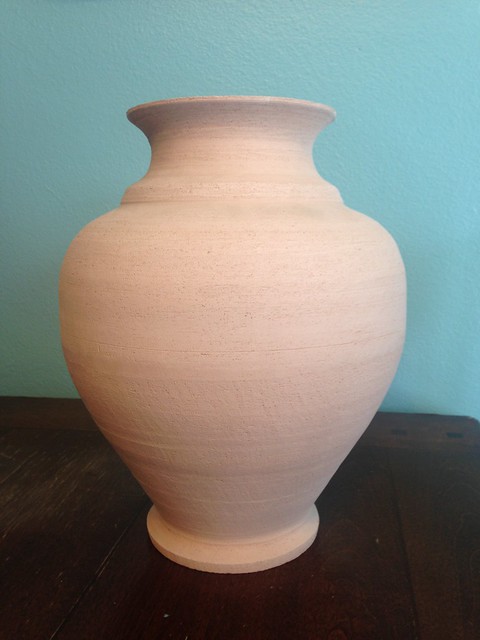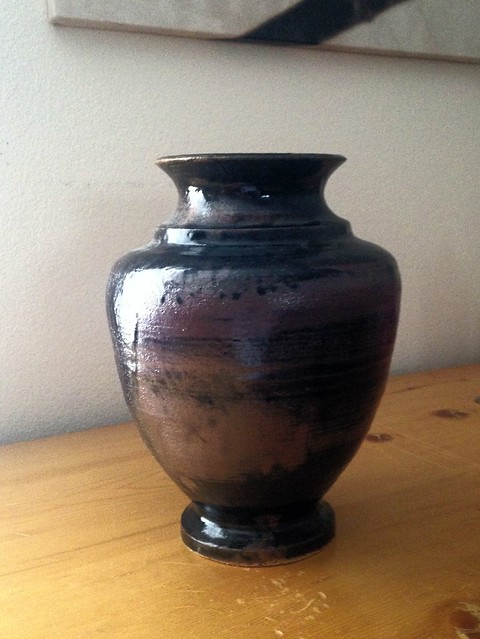"In the premortal realm, spirit sons and daughters... accepted [God's] plan by which his children could obtain a physical body and gain earthly experience and gain earthly experience to progress toward perfection."
When Scotty was in high school, he was a very gifted potter. He was often covered in dust and clay spats when he got home from school. He took as many pottery classes as he could finagle his way into, he won ribbons at the State Fair, and he lettered in visual arts.
When I married Scotty, I became part-owner of a plethora of pots. I have personally broken several of them (on accident, of course), so the supply has gotten smaller over time, but there are still quite a few in storage, and Scotty's mom has a bunch at her house that have remained unharmed.
Here is a pot that Scotty never finished. It was formed and fired once. From here, it needs to be glazed and fired again.
Here is a pot that is finished. This pot is called raku ware. In western art, raku is made by glazing and firing the pot and then covering it with combustible material. The pottery is exposed to smoke, which stops the chemical process in the glaze and creates a metallic sheen.
Something to note about pottery: before it is finished, it needs to be exposed to intense heat more than once. This process takes place in a kiln, also known as a crucible. A crucible is "a furnace-like vessel that endures intense heat and transfigures raw materials into a new, stronger substance. The crucible purges away impurities and unifies elements into an entirely new final product (Robinson, Carroll, and Marshall, 2012).
A crucible is also a metaphor, sometimes called "the refiner's fire," for trials that change our lives and have a refining effect (Robinson, Carroll, and Marshall, 2012).
President James E. Faust of the Church of Jesus Christ of latter-Day Saints once said:
Into every life there come the painful, despairing days of adversity and buffeting. There seems to be a full measure of anguish, sorrow, and often heartbreak for everyone, including those who earnestly seek to do right and be faithful. The thorns that prick, that stick in the flesh, that hurt, often change lives which seem robbed of significance and hope. This change comes about through a refining process which often seems cruel and hard. In this way the soul can become like soft clay in the hands of the Master in building lives of faith, usefulness, beauty, and strength. For some, the refiner’s fire causes a loss of belief and faith in God, but those with eternal perspective understand that such refining is part of the perfection process.
Having a crucible perspective means we seek for meaning in our hardships, and we allow ourselves to learn and grow from them. Having a crucible perspective means we're resilient, we have the ability to overcome difficulty, or we "struggle well." It doesn't mean we "get over it" or return entirely to the way we were before.
Sometimes resilience is likened unto a rubber band that is stretched and springs back to the where it was. I don't like this analogy because the purpose of trials isn't for us to spring back to where we were. Trials are meant to make us stronger and purify us - to change us - so I like to think more in terms of things that are made strong and beautiful by undergoing extreme heat - glass, gold, diamonds, steel, pottery.
I don't want to be a rubber band, I want to be a pot!
That's not to say that I'm inviting trials into my life, and that's not to say that I'm going to handle every trial with grace and perfection. Believe me, I'd much prefer to not experience pain and suffering at all. I agree with Carlfred Broderick, an LDS psychologist and family therapist who said:
...I do not want you to think that I believe anything good about pain. I hate pain. I hate injustice. I hate loss. I hate the things that we all hate. None of us love those things. Nor, as I say, do I think that God takes pleasure in the pain that comes to us. But, we came to a world where we are not protected from those things... Pain is terrible.
Indeed, pain is terrible, but we're all going to find ourselves in the refiner's fire during our mortal experience, and we can choose to become bitter or we can choose to become better.
Elder Richard G. Scott said:
It is important to understand that [the Lord's] healing can mean being cured, or having your burdens eased, or even coming to realize that it is worth it to endure to the end patiently, for God needs brave sons and daughters who are willing to be polished when in His wisdom that is His will (1994).
Again, I'll be the first to admit that I don't want any trials, but I know that in a crucible, we can be transfigured. We can be changed entirely for the better, if we allow it to be so. We can seek for meaning in the hard things we experience, and we can, as a result, be prepared to stand before our God in a purified state.
We can become glass, diamonds, gold, steel, or pottery.
-------------------------------------------------
This
post was inspired by "Crucibles and Healing: Illness, Loss, Death, and Bereavement" by W. David Robinson, Jason S. Carroll, and Elaine Sorensen Marshall published
in Successful Marriages and Families: Proclamation Principles and Research Perspectives, 2012. This piece of writing is part of my Family Proclamation project for FAML 100 at Brigham Young University Idaho.




No comments:
Post a Comment